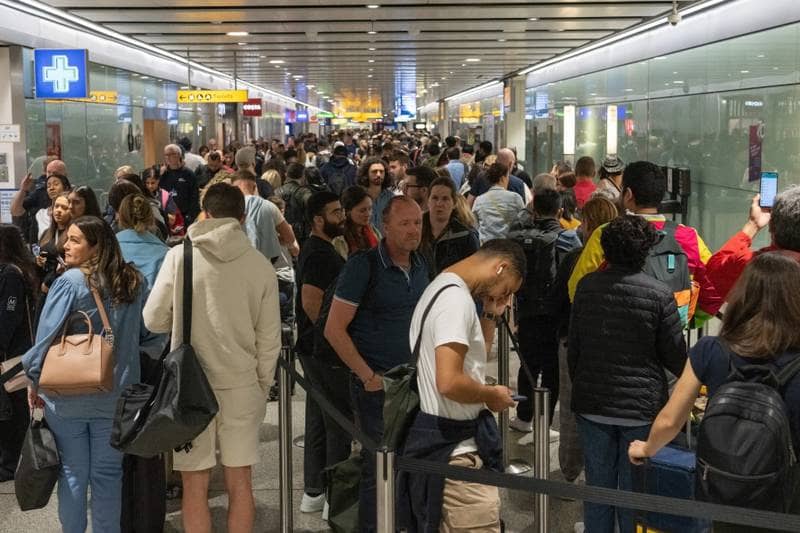Staffing shortages could become aviation sector's Achilles' heel, Moody's says
07 June, 2022

Staffing shortages plaguing airports and airlines in parts of the world could become the industry's Achilles' heel as it struggles to meet recovering travel demand after the easing of Covid-19 restrictions.
Staffing shortages are forcing airlines to cut capacity below planned levels, hampering their ability to serve the stronger-than-expected recovery in air travel demand, Moody's Investors Service said in a report.
Capacity constraints, particularly in the US and Europe, are expected to persist this year and for most of 2023, the credit rating agency said. "Several airlines have recently disclosed that they have reduced their schedules due to staffing constraints after substantially thinning their ranks in 2020 in response to the pandemic," Moody's said. "Meanwhile, the competition for pilots is intense, increasing airlines' costs for recruiting, hiring and training."
Global airlines are starting to rebound from a two-year slump in air travel, which was caused by the pandemic, as border restrictions are eased around the world.
However, staff shortages at airlines and airports have led to severe disruptions at some major hubs, resulting in cancelled flights and long security queues.
After waves of lay-offs at the peak of the pandemic, rehiring staff fast enough to meet recovering demand has become the industry's latest challenge.
The four-day weekend to celebrate Queen Elizabeth II’s platinum jubilee, coinciding with a half-term school holiday, has sparked a surge in travel from UK airports.
Travel chaos at Manchester, Birmingham and Dublin airports intensified on Friday, with frustrated passengers hitting out at the “horrendous” queues.
Capacity constraints caused by staff shortages forced British Airways to cancel 100 flights a day in April as it reduced its summer schedule to boost operating performance and minimise disruptions affecting passengers.
Moody's expects disruptions to continue for European airlines and airports, which are also facing staffing shortages, throughout the summer.
"In hindsight, the early retirement packages and/or furloughs that airlines initiated during the early stages of the pandemic thinned pilot ranks too much, particularly in the US and Europe," Moody's said.
"Staffing disruptions are coming home to roost for US, UK and European airlines and airport operations."
It takes time to train new employees and obtain their security clearances, which will remain challenging during 2022 and 2023 for several companies, the agency said.
Rebuilding the ranks will take years, particularly in the US, which requires pilots to have 1,500 hours of flying time before receiving a commercial pilot’s licence.
A first officer’s licence in Europe requires at least 200 hours of flying time after 800 hours of ground school.
"The US flight hour requirement, the longest in the world, will slow the rebuilding of US pilot ranks, limiting the operations of the US airlines, relative to their desired levels," Moody's said.
"At the same time, many US pilot contracts are up for negotiation and the shortfall in supply will lead to higher wages when new contracts are agreed."
Rising operating expenses, mainly labour costs and fuel prices, will remain a major headwind for airlines throughout 2022, the report said.
However, strong travel demand is bolstering the industry’s pricing power, allowing airlines to recoup a majority, if not most, of increased costs through fare increases, Moody's said.
"We consider all airlines have a moderate ability to pass on higher costs, including for labour or oil, to customers, through fare increases," it said.
"Operating less capacity by reducing the number of flights or using smaller aircraft on existing routes remains an important lever when ticket sales at desired fare levels decline."
The higher cost of air travel will not deter people from flying, at least this summer and throughout 2022, if there is no global recession, Moody's said.
However, in the autumn, the impact of cost inflation on the income and budgets of consumers and corporate travellers could lead to softer demand for air travel, it said. If this happens, current capacity constraints will protect airlines from having to many seats to fill.
"That said, even in a softer economic environment, the removal of entry restrictions and requirements by many governments across the globe will still drive continued recovery of the airlines," Moody's said.
Removing entry restrictions will stimulate the recovery of international travel and the reopening of offices by large companies, which will promote more business travel and contribute to sustained growth in travel demand well into 2023, the report said.
Source: www.thenationalnews.com
